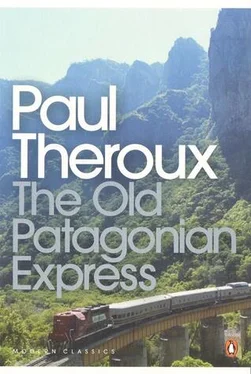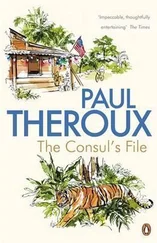Paul Theroux - The Old Patagonian Express - By Train Through the Americas
Здесь есть возможность читать онлайн «Paul Theroux - The Old Patagonian Express - By Train Through the Americas» весь текст электронной книги совершенно бесплатно (целиком полную версию без сокращений). В некоторых случаях можно слушать аудио, скачать через торрент в формате fb2 и присутствует краткое содержание. Год выпуска: 2008, Издательство: Penguin Books Ltd, Жанр: Путешествия и география, на английском языке. Описание произведения, (предисловие) а так же отзывы посетителей доступны на портале библиотеки ЛибКат.
- Название:The Old Patagonian Express: By Train Through the Americas
- Автор:
- Издательство:Penguin Books Ltd
- Жанр:
- Год:2008
- ISBN:нет данных
- Рейтинг книги:5 / 5. Голосов: 1
-
Избранное:Добавить в избранное
- Отзывы:
-
Ваша оценка:
- 100
- 1
- 2
- 3
- 4
- 5
The Old Patagonian Express: By Train Through the Americas: краткое содержание, описание и аннотация
Предлагаем к чтению аннотацию, описание, краткое содержание или предисловие (зависит от того, что написал сам автор книги «The Old Patagonian Express: By Train Through the Americas»). Если вы не нашли необходимую информацию о книге — напишите в комментариях, мы постараемся отыскать её.
The Old Patagonian Express: By Train Through the Americas — читать онлайн бесплатно полную книгу (весь текст) целиком
Ниже представлен текст книги, разбитый по страницам. Система сохранения места последней прочитанной страницы, позволяет с удобством читать онлайн бесплатно книгу «The Old Patagonian Express: By Train Through the Americas», без необходимости каждый раз заново искать на чём Вы остановились. Поставьте закладку, и сможете в любой момент перейти на страницу, на которой закончили чтение.
Интервал:
Закладка:
Realizing how well I understood these places, I clung to what was familiar and was reluctant to surrender it to the distance. That bridge, that church, that field. There is nothing shocking about leaving home, but rather a slow feeling of gathering sadness as each familiar place flashes by the window, and disappears, and becomes part of the past. Time is made visible, and it moves as the landscape moves. I was shown each second passing as the train belted along, ticking off the buildings with a speed that made me melancholy.
Here in Framingham, I had eleven cousins. There were bungalows and tame woods and ice-covered porches on hillsides; cleaner snow than I had seen in Boston. And some humanity. On this winter afternoon, children skidded hunched-over on skates on a frozen rink between derelict buildings. A moment later we crossed a class barrier: big pink, green, yellow and white oblongs of houses, some with swimming pools filled with snow. The Lake Shore Limited stopped traffic on Main Street, where a policeman whose puffy face was chilled the colour of salami, held the cars back with gloves like a bear's paws.
I had not come far. I could have hopped off the train and quite easily found my way back to Medford on a bus. I knew these places well, and yet I saw new things: a different texture in the suburban snow, the pally names on storefronts — 'Wally's', 'Dave's', 'Angle's' — and, repeatedly, American flags, the Stars and Stripes flying over petrol stations and supermarkets and in numerous yards. And a church steeple like a pepperpot. I could not remember having seen it before, but I had never rushed headlong from home like this. The length of the trip I intended allowed me to be attentive to detail. But the flags puzzled me — were these the pious boasts of patriots, or a warning to foreigners, or decorations for a national holiday? And why, in the littered yard of that rundown house, was a pretty little flag flapping loyally from a pole? On the evidence here it seemed an American obsession, a kind of image-worship I associated with the most primitive political minds.
The snow was bronzed by the setting sun and now I saw factories flying the flag, and advertising their products on their tall brick chimneys: SNIDER'S DRESSED BEEF, and on another the single word ENVELOPES. And like the armoury earlier, with its fake battlements, a cathedral with fake buttresses and a bell-less bell-tower, and some houses with columns which offered no support to the roof, purely decorative fakery repeated in a gingerbread villa. There was no pretence that it was not bogus, only an insistence on cuteness so common in American buildings, which have promoted fakery as legitimate in styles of architecture.
And between the small factory towns — now farther and farther apart — the dense woods were darkening, and the trunks of oak trees were black and forbidding, the shape of pulpits. As we neared Springfield night was falling on the bare hills, and in the snowy valleys the phosphorescence of the deep snow slipped towards black brooks, their surfaces roughened by the current. Since leaving Boston, water had been constantly in view: frozen lakes and ponds, half-frozen rivers, or streams with conches of ice at their banks and the moving water turned to ink by the twilight. Then the sun sank and the light which had moved down the sky drained into the hole where the sun had gone, and the window specks showing in the woods seemed to brighten. Far down on the road, a man in mittens stood alone by his gas station pumps, watching us pass.
Not long afterward we were in Springfield. I had clear memories of the place, of getting off the train at that very station on a winter night, and crossing the long bridge over the Connecticut River to Route 91, to hitch-hike the rest of the way to Amherst. There were ice-floes on the river tonight, too, and the dark slopes of woods on the far side, and the same knifing wind. Memories of school are always to me like memories of destitution, of inexperience, the joyless impatience I had suffered like poverty. And I had had some sadnesses there. But the movement of travel is merciful: before I could remember much — before this town and river could toss me a particular memory — it whistled and rushed me into the amnesia of night. We travelled west, the rumble of the train muffled by snowbanks, through the forests of Massachusetts. But even in that darkness I recognized it. It was not the opaque night, the uninterrupted dark, of a foreign country's hinterland. It was the darkness that only baffles strangers. It was an average evening for this time of year in this place; and I knew all the ghosts here. It was the darkness of home.
I was still sitting in my compartment. The champagne at South Station had left me groggy, and though I had a copy of William Faulkner's The Wild Palms in my lap, I had done no more than read three pages. On the back cover I had scribbled, policeman's face like salami and inky water and flags. And the rest of the time I had spent with my face turned to the window. I had not seen any other passengers — I hadn't looked. I had no idea who was travelling on this train, and in my listless state thought there would be plenty of time for socializing further on-if not tonight, then tomorrow in Chicago, or the day after in Texas. Or I could leave it all for Spanish America or another climate — just sit here reading until the weather changed, and then go for a stroll. But I found the Faulkner impenetrable; my curiosity overcame my listlessness.
There was a man in the corridor of the sleeping car (it was the only sleeping car on the train; it had a name, 'The Silver Orchid'). His face and forearms were against the window and he was staring, I suppose, at Pittsfield or the Berkshires — a paper-white birch grove smothered by night and snow, a row of fence posts visible because of the drifts in which they lay half-buried, and the shadowy lantern shapes of small cedars, and a frosting of flakes mimicking a contour of wind that streaked the pane of glass in front of his nose.
'This is like the Trans-Siberian,' he said.
'No, it's not,' I said.
He winced and went on staring. I walked to the end of the car, but felt bad for having snapped at him. I looked back and saw him still there, studying the darkness. He was elderly and what he had said to me was a friendly gesture. I pretended to look out of the window myself, and when he stretched and came towards me — he was doing a sort of tango to keep his balance, the way people walk on the decks of ships in storms — I said, 'Actually, there isn't this much snow in Siberia.'
'You don't say.' He kept moving. I could tell from his gruffness that I had lost him.
There would be no food until Albany, when the New York section, with its diner, was hooked to this train. So I went into the Lounge Car and had a beer. I packed my pipe and set it on fire and savoured the trance-like state of lazy reflection that pipe smoke induces in me. I blew myself a cocoon of it, and it hung in clouds around me, so comforting and thick that the girl who entered the car and sat down opposite seemed wraithlike, a child lost in fog. She put three bulging bags on her table, then tucked her legs under her. She folded her hands in her lap and stared stonily down the car. Her intensity made me alert. At the next table a man was engrossed in a Matt Helm story, and near him, two linesmen — they wore their tools — were playing poker. There was a boy with a short-wave radio, but his racket was drowned by the greater racket of the train. A man in a uniform was stirring coffee — a train man: there was an old greasy lantern at his feet. At the train man's table, but not speaking, a fat woman sneaked bites at a candy bar. She did it guiltily, as if she feared that at any moment someone would shout, Put that thing away!
'You mind not smoking?'
Читать дальшеИнтервал:
Закладка:
Похожие книги на «The Old Patagonian Express: By Train Through the Americas»
Представляем Вашему вниманию похожие книги на «The Old Patagonian Express: By Train Through the Americas» списком для выбора. Мы отобрали схожую по названию и смыслу литературу в надежде предоставить читателям больше вариантов отыскать новые, интересные, ещё непрочитанные произведения.
Обсуждение, отзывы о книге «The Old Patagonian Express: By Train Through the Americas» и просто собственные мнения читателей. Оставьте ваши комментарии, напишите, что Вы думаете о произведении, его смысле или главных героях. Укажите что конкретно понравилось, а что нет, и почему Вы так считаете.












